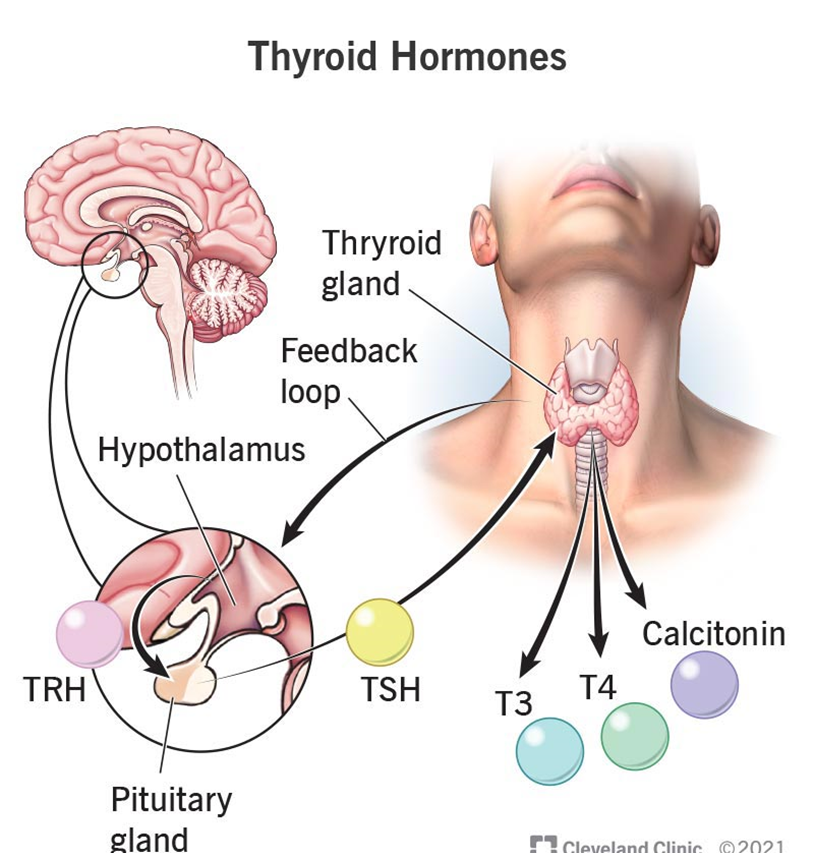A nurse is reviewing a client’s laboratory results and sees that their hemoglobin A1C is 9. Which of the following statements from the nurse is appropriate?
You have many dangerously low blood sugar levels.
Your average blood sugar is high.
Your blood sugar is too high after meals.
Your blood sugar is very unstable.
The Correct Answer is B
Choice A Reason:
This statement is incorrect because a hemoglobin A1C level of 9% indicates that the client’s blood sugar levels have been consistently high over the past two to three months. Hemoglobin A1C is a measure of average blood glucose levels, not low blood sugar levels. Therefore, it would be inappropriate to suggest that the client has dangerously low blood sugar levels based on this result.
Choice B Reason:
This statement is correct because a hemoglobin A1C level of 9% indicates that the client’s average blood sugar levels are high. Hemoglobin A1C reflects the average blood glucose levels over the past two to three months. A normal A1C level is below 5.7%, while an A1C level between 5.7% and 6.4% indicates prediabetes, and an A1C level of 6.5% or higher indicates diabetes. Therefore, an A1C level of 9% clearly shows that the client’s average blood sugar is high.
Choice C Reason:
This statement is partially correct but not the most appropriate. While it is true that a high hemoglobin A1C level can indicate that blood sugar levels are high after meals, it is not specific enough. Hemoglobin A1C measures the average blood glucose levels over a period of time, not just after meals. Therefore, the statement “Your average blood sugar is high” is more accurate and appropriate.
Choice D Reason:
This statement is incorrect because it is too vague and does not provide specific information about the client’s blood sugar levels. While a high hemoglobin A1C level can indicate variability in blood sugar levels, it primarily reflects the average blood glucose levels over the past two to three months. Therefore, it would be more appropriate to state that the client’s average blood sugar is high.
Nursing Test Bank
Naxlex Comprehensive Predictor Exams
Related Questions
Correct Answer is B
Explanation
Choice A reason: Increased Thirst, Increased Urine Output, and Weight Loss
Increased thirst, increased urine output, and weight loss are symptoms commonly associated with diabetes mellitus, particularly uncontrolled diabetes. These symptoms occur due to the body’s attempt to eliminate excess glucose through urine, leading to dehydration and subsequent weight loss. However, these symptoms are not typically associated with elevated TSH levels, which indicate hypothyroidism.
Choice B reason: Fatigue, Constipation, Weight Gain
Fatigue, constipation, and weight gain are classic symptoms of hypothyroidism2. When the thyroid gland is underactive, it produces insufficient thyroid hormones, leading to a slowdown in the body’s metabolism. This results in fatigue, weight gain, and constipation, among other symptoms. Elevated TSH levels are a compensatory response by the pituitary gland to stimulate the thyroid to produce more hormones, confirming hypothyroidism.

Choice C reason: Anxiety, Unintended Weight Loss, Palpitations
Anxiety, unintended weight loss, and palpitations are symptoms typically associated with hyperthyroidism, not hypothyroidism. Hyperthyroidism occurs when the thyroid gland produces excessive thyroid hormones, leading to an accelerated metabolism. This results in symptoms such as weight loss, increased heart rate (palpitations), and anxiety. Elevated TSH levels would not be expected in hyperthyroidism; instead, TSH levels would be low due to negative feedback from high thyroid hormone levels.
Choice D reason: Shakiness, Sweating, Nausea
Shakiness, sweating, and nausea can be symptoms of various conditions, including hypoglycemia (low blood sugar), anxiety, or panic attacks. These symptoms are not specific to thyroid dysfunction and are not typically associated with elevated TSH levels. Hypothyroidism, indicated by high TSH levels, usually presents with symptoms related to a slowed metabolism, such as fatigue and weight gain, rather than shakiness and sweating.
Correct Answer is C
Explanation
Choice A Reason:
While monitoring the frequency of urination is important for managing diabetes insipidus, it is not the most critical aspect of discharge teaching. Diabetes insipidus causes excessive urination, and patients should be aware of this symptom. However, understanding the importance of wearing a medical alert bracelet is more crucial for ensuring immediate and appropriate care in emergencies.
Choice B Reason:
Changes in appetite are not a primary concern for patients with diabetes insipidus. The condition primarily affects fluid balance and urine output rather than appetite. Therefore, this topic is less relevant compared to the need for a medical alert bracelet.
Choice C Reason:
The benefit of a medical alert bracelet is paramount for patients with diabetes insipidus. In case of an emergency, the bracelet can inform healthcare providers about the patient’s condition, ensuring they receive appropriate and timely treatment. This can be life-saving, especially if the patient is unable to communicate their medical history.
Choice D Reason:
Weight gain or loss can be a secondary concern for patients with diabetes insipidus, as the condition primarily affects fluid balance. While it is important to monitor weight to assess fluid status, it is not as critical as ensuring the patient understands the importance of wearing a medical alert bracelet.
Whether you are a student looking to ace your exams or a practicing nurse seeking to enhance your expertise , our nursing education contents will empower you with the confidence and competence to make a difference in the lives of patients and become a respected leader in the healthcare field.
Visit Naxlex, invest in your future and unlock endless possibilities with our unparalleled nursing education contents today
Report Wrong Answer on the Current Question
Do you disagree with the answer? If yes, what is your expected answer? Explain.
Kindly be descriptive with the issue you are facing.
